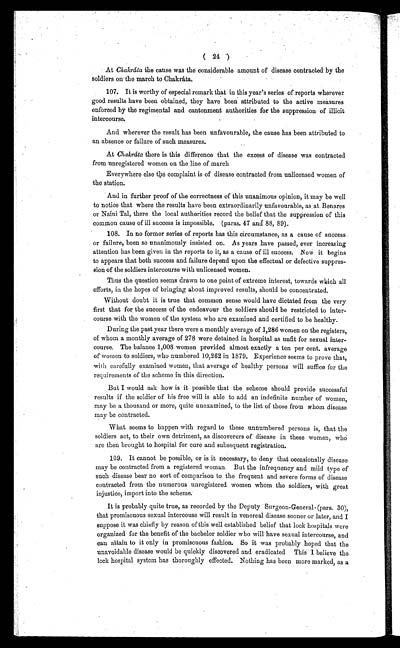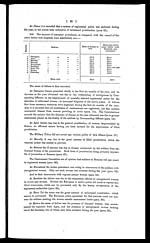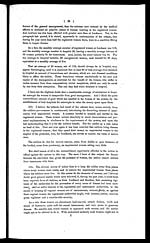Medicine - Institutions > Lock hospitals > Annual report on the working of the lock hospitals in the North-Western Provinces and Oudh > Sixth annual report of the working of the lock hospitals in the North-Western Provinces and Oudh, for the year 1879
(214) Page 24
Download files
Individual page:
Thumbnail gallery: Grid view | List view

(24)
At Chakráta the cause was the considerable amount of disease contracted by the
soldiers on the march to Chakráta.
107. It is worthy of especial remark that in this year's series of reports wherever
good results have been obtained, they have been attributed to the active measures
enforced by the regimental and cantonment authorities for the suppression of illicit
intercourse.
And wherever the result has been unfavourable, the cause has been attributed to
an absence or failure of such measures.
At Chakráta there is this difference that the excess of disease was contracted
from unregistered women on the line of march
Everywhere else the complaint is of disease contracted from unlicensed women of
the station.
And in further proof of the correctness of this unanimous opinion, it may be well
to notice that where the results have been extraordinarily unfavourable, as at Benares
or Naini Tal, there the local authorities record the belief that the suppression of this
common cause of ill success is impossible. (paras. 47 and 88, 89).
108. In no former series of reports has this circumstance, as a cause of success
or failure, been so unanimously insisted on. As years have passed, ever increasing
attention has been given in the reports to it, as a cause of ill success. Now it begins
to appears that both success and failure depend upon the effectual or defective suppres-
sion of the soldiers intercourse with unlicensed women.
Thus the question seems drawn to one point of extreme interest, towards which all
efforts, in the hopes of bringing about improved results, should be concentrated.
Without doubt it is true that common sense would have dictated from the very
first that for the success of the endeavour the soldiers should be restricted to inter-
course with the women of the system who are examined and certified to be healthy.
During the past year there were a monthly average of 1,286 women on the registers,
of whom a monthly average of 278 were detained in hospital as unfit for sexual inter-
course. The balance 1,008 women provided almost exactly a ten per cent. average
of women to soldiers, who numbered 10,262 in 1879. Experience seems to prove that,
with carefully examined women, that average of healthy persons will suffice for the
requirements of the scheme in this direction.
But I would ask how is it possible that the scheme should provide successful
results if the soldier of his free will is able to add an indefinite number of women,
may be a thousand or more, quite unexamined, to the list of those from whom disease
may be contracted.
What seems to happen with regard to these unnumbered persons is, that the
soldiers act, to their own detriment, as discoverers of disease in these women, who
are then brought to hospital for cure and subsequent registration.
109. It cannot be possible, or is it necessary, to deny that occasionally disease
may be contracted from a registered woman. But the infrequency and mild type of
such disease bear no sort of comparison to the frequent and severe forms of disease
contracted from the numerous unregistered women whom the soldiers, with great
injustice, import into the scheme.
It is probably quite true, as recorded by the Deputy Surgeon-General- (para. 30),
that promiscuous sexual intercouse will result in venereal disease sooner or later, and I
suppose it was chiefly by reason of this well established belief that lock hospitals were
organized for the benefit of the bachelor soldier who will have sexual intercourse, and
can attain to it only in promiscuous fashion. So it was probably hoped that the
unavoidable disease would be quickly discovered and eradicated This I believe the
lock hospital system has thoroughly effected. Nothing has been more marked, as a
Set display mode to: Large image | Zoom image | Transcription
Images and transcriptions on this page, including medium image downloads, may be used under the Creative Commons Attribution 4.0 International Licence unless otherwise stated. ![]()
| Permanent URL | https://digital.nls.uk/75111474 |
|---|




